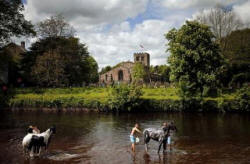|
 Name
it or lose it, says British landscape writer Macfarlane Name
it or lose it, says British landscape writer Macfarlane
 Send a link to a friend
Send a link to a friend
[June 10, 2015]
By Nigel Stephenson
HAY-ON-WYE, Wales (Reuters)
- It's a shard, a smeuse, a smout, and for some
creatures it's a perfect place to squiggle.
|
|
Each of the nouns means, more or less, a gap in a hedge in
various dialects of English, while to squiggle is to wriggle
through a hedge in the county of Essex, northeast of London.
Prize-winning British landscape writer and Cambridge University
academic Robert Macfarlane has collected hundreds of such terms
from Britain and Ireland in his book "Landmarks" and, he says,
we lose them at our peril.
"Whenever you name a landscape, it can be a controversial as
well as an intimate act," he told Reuters in an interview at the
Hay Festival.
In "Landmarks", his fifth book, he says there is an urgent need
for a "Counter-Desecration Phrasebook" to counter the
cost-benefit framework that is often used to talk about nature.
He recounts how in 2004 an engineering company proposed building
234 wind turbines on the island of Lewis off Scotland's west
coast.
Supporters of the scheme described the site as an empty, dead
wilderness. So opponents assembled a "Peat Glossary" of terms
describing the landscape and the living things and activities it
supports. The wind farm scheme was rejected.
The nine glossaries in "Landmarks", include names for upland,
flatland, coastal and wooded landscapes and even the "bastard
countryside" on the edge of cities.
Since the book was published earlier this year, Macfarlane has
gathered hundreds more terms from walkers and workers and some
will form a new glossary in the paperback.
[to top of second column] |
"Much to my surprise, it has been and become a political book. I now
see that it's a celebration and defense of landscape and its
language," he said.
The book is also a tribute to some of the writers who have
influenced Macfarlane, including Scots-born John Muir who is viewed
as the father of the U.S. national parks.
"He understood very early on that literature was a powerful
mind-changing force but it needed to manifest in policy and
legislation as well," he said.
Not that Macfarlane, who teaches English literature at Emmanuel
College, Cambridge, and whose previous books have led readers over
mountains, snowfields and ancient paths accessible only at low tide,
proposes the countryside be immune from the modern world.
Fields near his home on the edge of Cambridge are about to be
developed for housing but he has not opposed the plans.
"We have to grow but nature needs to be remembered ... So how we can
build nature into our future cities seems to me one of the most
important development questions we face in this country," he said.
(Editing by Michael Roddy and Robin Pomeroy)
[© 2015 Thomson Reuters. All rights
reserved.] Copyright 2015 Reuters. All rights reserved. This material may not be published,
broadcast, rewritten or redistributed. |